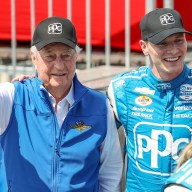 In addition to being a comic and actor, Judah Friedlander is a passionate ping pong enthuasiast.
In addition to being a comic and actor, Judah Friedlander is a passionate ping pong enthuasiast.
Credit: Getty Images
Judah Friedlander only spent a day shooting Michael Tully’s indie comedy “Ping Pong Summer,” and he hasn’t actually seen it yet. (He’s excited to do that this weekend, when it opens.) But the film — a look at a 13-year-old (Marcello Conte) on an Ocean City, Maryland vacation in 1985 — concerns one of the comic and actor’s greatest passions: table tennis.
“I’m a big advocate for the sport of ping pong. That’s how I got involved in the movie,” Friedlander says. He was brought in thanks to Susan Sarandon, one of the film’s supporting players and herself an ardent ping pong champion. Sarandon co-owns SPiN, a ping pong club located in Manhattan’s Flatiron district, one of the places Friedlander frequents. That’s how he got to know her, even before she played his girlfriend for a stretch on “30 Rock.”
“Susan’s not a professional like I am,” he says. “But Susan’s a huge fan of the sport. She and SPiN have done more to popularize ping pong than anyone. If you look online or on TV or commercials, you see ping pong everywhere. You never used to see it anywhere. I credit Susan and SPiN with doing that.”
Despite being a Maryland native who grew up during “Ping Pong Summer”’s ’80s era, the sport was the main thing to which he really related. “I never got to go to Ocean City. As a kid if we were took a vacation, it was never a beach vacation. It was always a serious trip to learn stuff — museums, ruins, culture, that kind of stuff. It was never, ‘Let’s relax and have fun.’ It was work.”
Growing up, Friedlander’s main sport was soccer, though he played ping pong too. “Maryland has actually some of the best ping pong clubs in the country,” he reveals. “I played in the kid’s rec center, in a basement, and the rec center had a similar vibe to what you see in ‘Ping Pong Summer.’ And then one day one of our friends came in, and he had all these new strokes, new serves. We found out later he was learning from this Chinese guy down the street.”
 The film “Ping Pong Summer,” which features Friedlander in a small role, recreates the rec centers of the comic and actor’s youth.
The film “Ping Pong Summer,” which features Friedlander in a small role, recreates the rec centers of the comic and actor’s youth.
Credit: Gravitas Ventures
From there they learned that ping pong was considered, throughout Asia and Europe, to be an actual sport, with official sanctioned tournaments. Games conflicted with Friedlander’s soccer games, though he participated in one tournament.
It wasn’t until 2008 that he returned to it full-force. “I found myself up at 3:30 in the morning watching live ping pong from the Beijing Olympics online,” he recalls. He found himself newly obsessed. But it wasn’t just about the sport itself. “Exercise is good for you, but going to the gym depresses me. Sports I love, but working out just depresses me. But I needed the exercise.”
Friedlander started hitting up all the spots in New York as well as Jersey. “Most of the ping pong clubs are real training centers, where there are ten tables, no heat, no water, no air conditioning. Maybe there’s a soda machine, but that’s it. And they’re usually in basements.”
Still, he is, by his own admission, not a great player. “For someone who plays official sanctioned tournaments, I’m an average player,” he says. “But for someone who doesn’t play official tournaments I should be able to crush anybody.”
He even won a tournament on the set of “Ping Pong Summer,” though he says the guy who was serving as technical advisor for the sport was not there at the time. And he was only there for a day, playing a small part that was given to him after the principal roles (including Sarandon, Amy Sedaris and Lea Thompson) were already cast. He just wanted to be in it, and he was rewarded with seeing a set that dutifully recreated the rec centers and arcades of his youth.
“Young kids don’t realize that back in the ’80s, there were no good home video games,” he says. “The way you played video games was you went to a place that had video games where you put a quarter in a machine. Some places would have an air hockey table and that kind of stuff.”
Of course, Friedlander did write a book — 2010’s “How to Beat Up Anybody: An Instructional and Inspirational Karate Book by the World Champion” — in which he made joking pronouncements of his physical prowess, like having an “extra-dark black belt” in karate. Can we really trust his boasts about his table tennis skills?
He replies, “I’m legit if I’m actually good at something.”
Follow Matt Prigge on Twitter @mattprigge
















